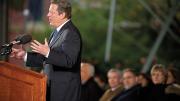Al Gore ’69, LL.D. ’94, spoke about sustainability to a packed Tercentenary Theatre on October 22; the former vice president, who has won a Nobel Prize and an Academy Award for his efforts to fight global climate change, was in Cambridge to receive the Robert Coles “Call to Service Award” from the Phillips Brooks House Association.
“We need to substitute renewable energy for carbon-based energy. It is just that simple,” he told the students, faculty, and staff members who had gathered also to celebrate the University’s commitment to reducing its greenhouse-gas emissions 30 percent from 2006 levels by 2016 (see “Environmental Action,” September-October 2008, page 57). His speech capped a week of events emphasizing environmental stewardship, ranging from sustainable meals served in the dining halls to seminars and lectures on such topics as recycling and energy conservation.
Noting that the United States imports $700 billion worth of foreign oil each year, and that “continued access to the largest single source of proven oil reserves in the world” was one of many reasons for the miscalculation in entering the costly war in Iraq, Gore argued that “the economic crisis, the financial crisis, the debt crisis, and the climate crisis all have the same thread running through them: overdependence on carbon-based fuels. When you pull that thread,” he said, “all of these crises begin to unravel and you hold in your hand the solution….We need to put a price on carbon, we need a global treaty, and we need American leadership.”
Gore said that the role of the university in our civilization’s effort to solve an existential crisis is worthy of some attention. “How do we incorporate new knowledge into our understandings of who we are and what we must do?” he asked. Harvard president Drew Faust touched on the same theme, saying, “Harvard must be a model…as we unite the knowledge and the passion of this community in service of broad and essential goals….We must recognize,” she added, “that our practices have pedagogical value. We teach with what we do, as well as with what we write or what we say: how we light our classrooms; how we heat our water; how we build and ventilate our laboratories.”
Though Faust’s remarks were directed to the University community, which is now charged with meeting the Greenhouse Gas Task Force’s ambitious goals, Gore addressed a wider audience. “One of the solutions to the climate crisis,” he said, “involves making a generational commitment to a one-off, massive investment...in a new energy infrastructure that is not free, but that is based on fuels that are free forever: the sun and the wind and the natural heat of the earth. We can, with American leadership, galvanize a global commitment to solve the climate crisis. We have everything we need, with the possible exception of political will—but political will is a renewable resource.” (For audio recordings of the Gore and Faust addresses, see harvardmagazine.com/breaking-news/gore-speaks-on-sustainability.)










